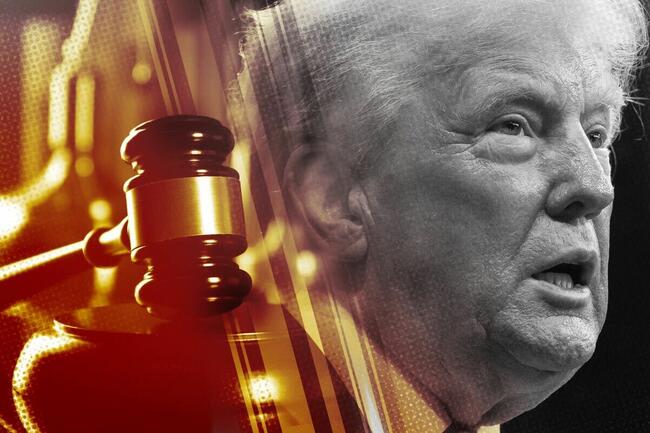You have /5 articles left.
Sign up for a free account or log in.

An injunction has been placed on two of Trump’s anti-DEI executive orders. But no lawsuit has been filed yet against a recent letter from the Education Department that calls for similar penalties to colleges that continue DEI programs.
Photo illustration by Justin Morrison/Course Strat | Zolnierek/iStock/Getty Images | Rebecca Noble/Getty Images
Even though a federal judge rebuked the Trump administration’s efforts to crack down on diversity, equity and inclusion as “textbook viewpoint discrimination,” the Education Department is still moving forward with guidance that requires colleges to end any race-conscious programs on campus by the end of this week or lose access to federal funds.
The injunction, handed down Friday in a lawsuit filed by multiple higher ed organizations, blocked parts of two White House executive orders. But questions were raised about whether the order extended to a sweeping Dear Colleague letter the department issued Feb. 14.
The plaintiffs who challenged the anti-DEI orders say the four-page guidance letter is “inconsistent” with the judge’s ruling, which found that the language in the two anti-DEI executive orders was unconstitutionally vague. The judge blocked the Trump administration from terminating “equity-related” grants and investigating wealthy colleges. But the department says the injunction does not cover its guidance document. Outside higher education lawyers largely agree with the department and suggest that colleges should still prepare to comply.
“My short-term or abbreviated thought would be to proceed with caution,” said Jackson Sharman III, a partner at Lightfoot, Franklin & White LLC.
Craig Trainor, acting assistant secretary for civil rights, doesn’t think there should be any confusion after the injunction. He said in a statement to Course Strat that the letter was based on federal law, such as Title VI of the Civil Rights Act of 1964, which prohibits discrimination based on race, color or national origin, and the equal protection clause in the Constitution—not the president’s executive orders.
“While additional guidance is forthcoming, this isn’t complicated,” he said. “When in doubt, every school should consult the SFFA legal test contained in the DCL: ‘If an educational institution treats a person of one race differently than it treats another person because of that person’s race, the educational institution violates the law.’”
John Yang, president of Asian Americans Advancing Justice—AAJC, which represented the plaintiffs along with Democracy Forward, countered that the Dear Colleague letter is “problematic” and “inconsistent” with prior rulings from multiple courts against Trump’s anti-DEI actions.
Yang declined, however, to explain why the DCL is inconsistent or whether the existing injunctions include the letter, because the lawsuit is ongoing.
“We are aware of the timeline for the Dear Colleague letter and so we’re going to move as quickly as we can,” he said. “This is going to be an issue that continues to evolve.”
Outside legal experts largely say that the injunction doesn’t currently affect the department’s Dear Colleague letter.
“These are clearly efforts by the current administration to get at similar concerns around DEI programming, but they use different levers,” said Aaron Lacey, a partner and co-chair of the Higher Education Practice Group at Thompson Coburn LLP.
The lawsuit focused on the executive orders, which call on all agencies to “combat illegal private-sector DEI preferences, mandates, policies, programs, and activities.” But the letter provided a new interpretation of existing case law.
“That litigation predated that Feb. 14 DCL, so the focus of those lawsuits is specifically the executive orders,” Lacey said. “And as you know, the executive orders give specific direction to the agencies. So the injunctions from the courts are essentially telling the agencies not to do those things. Which is just different from the Dear Colleague letter, which is saying, these civil rights laws already exist … and here’s our interpretation of those things.”
But Sharman, the lawyer at Lightfoot, Franklin & White, wasn’t as quick to make a hard-and-fast judgment call.
He acknowledged that there is a sound case for why the Dear Colleague letter is similar to the executive orders and should be included in the injunction, but he also said that until a federal judge says as much, college leaders should proceed with caution.
“It’s a hazardous business to try to predict how those things will play out,” Sharman said. “Because if it doesn’t work, what’s the institution’s defense? ‘Well, we had a good-faith belief that the law had been put on hold.’”
Lacey added that though his firm does not interpret the current injunction as one that protects colleges from the department’s deadline, it is quite possible that there will be new litigation introduced before Feb. 28 to “scoop in the DCL.” (The American Association of University Professors, which sued over the executive orders, told Course Strat that it also plans to challenge the letter in court.)
“It’s not all going to be perfect. It’s not like you just copy and paste the same arguments,” he said. “But I do think fundamentally you’ve got the same parties that are facing a very similar set of challenges with the DCL that they face on the executive order.”
In the meantime, Thompson Coburn is advising college administrators to take inventory of all programs that could violate the DEI guidance, understand what funding is at risk and then calculate their personal risk tolerance. But after preparing and doing all that, Lacey said, many colleges will wait and see what happens.
“We’re just operating in this environment of significant and rapid change, and so what we’re really focused on is trying to help institutions develop constructs in which to make good decisions,” he explained. “Let’s see if we get more litigation. But we need to be ready to act quickly if need be.”








